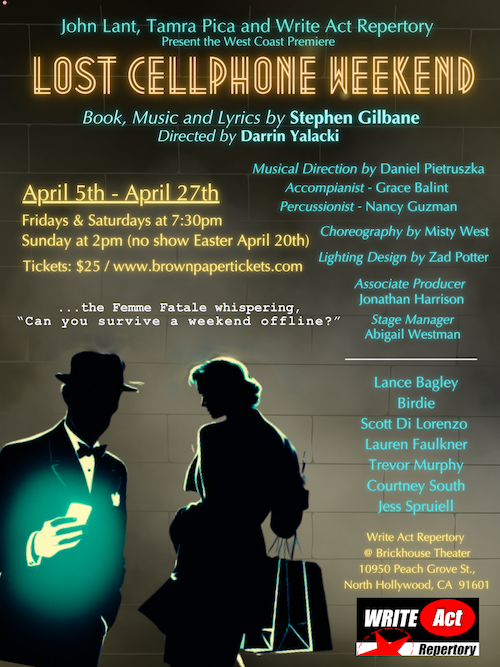Lauren Weinberg and Brian Krinsky (Photo by Jason Niedle/TETHOS)
Reviewed by Dana Martin
Laguna Playhouse and North Coast Repertory Theatre
Through August 11th
RECOMMENDED
In an idyllic society that champions civility, virtue and proper deeds, Camelot is a love triangle for the ages. With book & lyrics by Alan Jay Lerner, music by Frederick Loewe, and based on the fantasy novel The Once and Future King by T.H. White, the current co-production from Laguna Playhouse and North Coast Repertory Theatre entertains while remaining a relic of the past.
Arthur (Jered McLenigan), the young and very insecure King of Camelot, would rather swing from trees than rule a kingdom. Years earlier he was a poor young squire on an errand to fetch his knight a replacement sword when he stumbled upon a sword in a stone. Attempting to work smarter, not harder, he gives the sword a few good tugs and, to the surprise of all, frees the sword — which happens to be the magical Excalibur — and is promptly declared the king.
The action begins as Arthur petulantly awaits his wife-to-be Guenevere (Lauren Weinberg), a queen from Scotland whom he’s never met. His lifelong mentor Merlin (Jason Heil) provides loads of exposition and promptly vanishes — but not before foreshadowing the impending infidelity of Guenevere and Lancelot (Brian Krinsky), one of Arthur’s most loyal and virtuous knights. Arthur’s soggy memory and naivete prevents him from recalling such crucial intel.
Arthur meets and marries Guenevere and his life, world and sense of purpose shift. In the five years that follow, Arthur subverts the reining motto “might is right” by introducing a code of conduct for his knights that champions a code of conduct based on honor, courage, and fairness.
When the brooding and devoted young Lancelot joins Arthur and the Knights of the Round Table, he’s almost immediately smitten with Guenevere, who slyly reciprocates. Arthur senses Guenevere and Lancelot’s growing attraction but his love for his wife and his loyal friend forces him to internalize the betrayal. He sets a trap in order to expose their infidelity, which results in the collapse of the Round Table and the society he’s so carefully crafted as his kingdom devolves into war.
Camelot was first produced in 1960 and was the last theatrical venture between Lerner and Loewe. The book leaves a lot to be desired and the music isn’t the duo’s most magnetic work, though it still retains magic. This co-production of Camelot is an entertaining evening and a glimpse into the musical canon of a bygone era.
Direction by Jeffrey B. Moss is solidly traditional. The play starts out broadly comedic, then struggles to transcend the this initial cartoonish quality and settle into something deeper and more grounded. Marty Burnett’s set is a generic castle façade that is serviceable for the story’s many indoor and outdoor locations. Jill Gorrie Rovatsos’ choreography is clean and simple. Musical director Daniel Lincoln’s gets stellar, sound performances out of the performers as well as musicians Steve Chiu (violin), Wendell Kelly (trombone), Karen Linkletter (cello), and Mark Margolies (flute/clarinet/bass clarinet).
Jered McLenigan’s Arthur is an altruistic leader plagued with self-doubt. Greatness — and the crown — has been thrust upon him. McLenigan takes the biggest journey toward emotional maturity; his Arthur evolves. He incorporates aspects of the naivete of his youth into the existing container of a man who grapples with his own image of a just and goodly King. Lauren Weinberg’s Guenevere is no withering flower; she’s a quick-witted spitfire with a dark side. Weinberg’s voice is commanding and beautiful; her acting is layered and while her Guenevere is precocious and coquettish — she does not demure. Brian Krinsky’s Lancelot is dashing, perpetually brooding and brazenly confident. Krinsky often plays the character at surface level. Nick Apostolina’s too-brief cameo as Mordred, Arthur’s long-lost son who randomly appears in Act II, gives Ramsey Bolton supervillain vibes. Jacob Caltrider as Sir Dinadin, Jason Heil Merlyn as Sir Gareth, Scott Hurst Jr. as Lionel, Cole Fletcher as Sir Sagramore and Noah Weibel as Tom of Warwick provide solid support.
Audrey Casteris’ prop design is well-appointed and appropriate. Fight coordination by Benjamin Cole is basic and simple. Costume designer Elisa Benzoni is true to the time period and helps the audience mark the passage of time as well as keep track of the various alliances that are crucial to clarifying the story. Matt Novotny’s lighting design is moody and dramatic, with tight spots for forced perspective and foreshadow. Ian Scot’s sound design is excellent; the singers’ voices are prominent and blend well with the orchestra. Peter Herman’s hair and wig design is interesting: Herman removes the fringe from Guenevere’s face in the second act, signaling a shift in her persona and her shifting alliance.
Camelot is a utopian fantasy kingdom that champions the chivalry of the pure-hearted, endlessly courageous Knights of the Round Table, who clear the way for a civilized, peaceful and fair society that depends on humans being on their best behavior — clearly a losing proposition. Arthur truly wants to be good and do good in the world, and expects everyone to behave accordingly; he’s sweet but naïve. His dream for a just society and his marriage are destroyed by misplaced passion and betrayal. In spite of that, Arthur offers Guenevere forgiveness, which is his most courageous act and one of the story’s most relatable moments.
Laguna Playhouse, 606 Laguna Canyon Drive, Laguna Beach. Wed.-Fri., 7:30 p.m.; Sat, 2 p.m. & 7:30 p.m.; Sun., 1 p.m. & 5:30 p.m.; Thurs. 8/1, 2 p.m.; Tues. 8/6, 7:30 p.m.; thru August 11; https://LagunaPlayhouse.com or (949)- 497- 2787. Running time: two hours and 10 minutes with one intermission.












